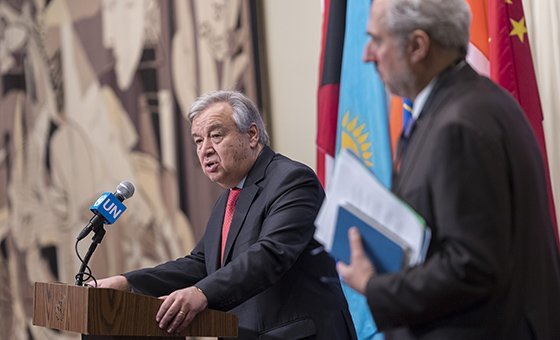In a press briefing on Wednesday, Mr. Guterres said that the meetings, both of which he is attending, come at a crucial moment: “Our world is obviously facing a crisis of confidence. Those left behind by globalization are losing trust in governments and institutions,” he told journalists at UN Headquarters in New York.
“Inequality is pervasive and increasing, especially within nations. Trade disputes are escalating. And an undercurrent of geopolitical tensions is adding further pressure to the global economy.”
The UN Chief outlined some examples of the stark, climate-related challenges the world is facing, such as Tuesday’s UN Environment report – calling for a five-fold increase in climate action to limit global temperature rises to 1.5 degrees by the end of the century – and the World Meteorological Organization’s announcement that carbon dioxide levels have increased to levels not seen in 3 million years.
Mr. Guterres made a passionate call for immediate action, pointing out that the social, economic and environmental costs of climate change dwarf the costs of acting now: “Failure to act means more disasters and emergencies and air pollution that could cost the global economy as much as US$21 trillion by 2050.”
“On the other hand,” he added, “ambitious climate action will not only slow temperature rise, it will be good for economies, for the environment and for public health. Climate solutions represent opportunity, and technology is on our side. They are wise investments in an equitable, prosperous and sustainable future. Green business truly is good business.”
Turning to the funding needed for climate change mitigation and adaptation, the Secretary-General recalled the pledge to mobilize $100 billion per year for climate action in support of the developing world by 2020, and welcomed Germany’s Wednesday announcement to donate $1.5 billion to the Green Climate Fund: “the members of the G20 (group of industrialized nations) are responsible for more than three-quarters of greenhouse emissions. Yet it is equally true that G20 members have the power to bend the emissions curve. They also have the resources to provide the financing needed for both mitigation and adaptation.”
Ahead of the opening of the G20 on Friday in Buenos Aires, Mr. Guterres has sent a letter to the Heads of State taking part, in which he warns of the “increasingly acute” threats to human prosperity posed by climate-change and rising inequality, and underlines the need to preserve and renew multilateralism in order to “redirect globalization towards sustainable development for all.”
To achieve the 2030 Agenda for sustainable development, the UN’s blueprint to transform the world for the better, the Secretary-General outlines 7 areas for G20 leaders to prioritize: Implementing the 2030 Agenda for Sustainable Development, Financing for Sustainable Development, Climate Action, Sustainable Food Future, Gender Equality and Empowerment of Women, The Future of Work, and Migrants and Refugees.
The letter ends with an appeal to the leaders to conclude with an ambitious communiqué that “responds to the challenges of our time and upholds the spirit of cooperation.”

